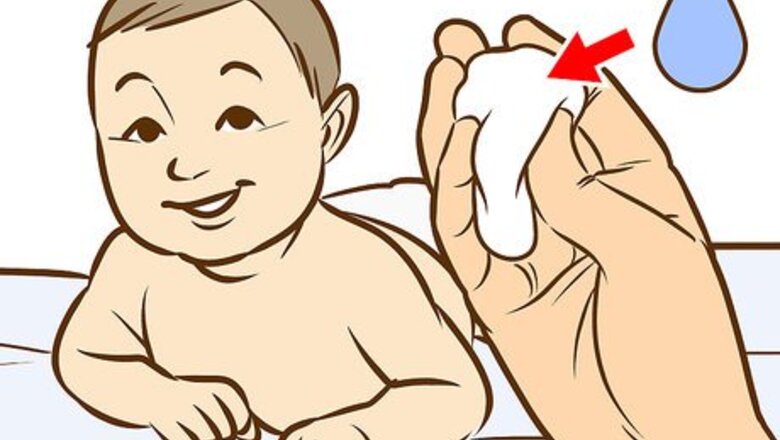
views
X
Trustworthy Source
Cleveland Clinic
Educational website from one of the world's leading hospitals
Go to source
Cleaning Around the Nose
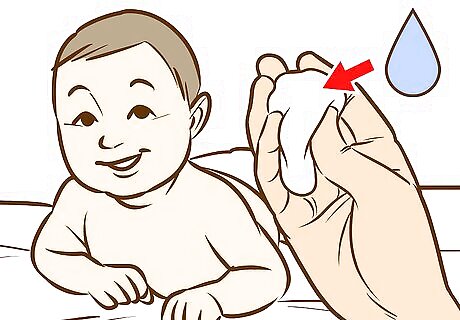
Use a damp cotton ball. If your baby has a runny nose or crust around their nose, you should gently remove the mucus and crust. Dampen a cotton ball with warm water. Carefully, wipe the debris away. If the mucus is crusted underneath, soften it with the moist cotton ball before removing. This helps reduce discomfort. Make sure to wipe away from the nose, not towards the nose.
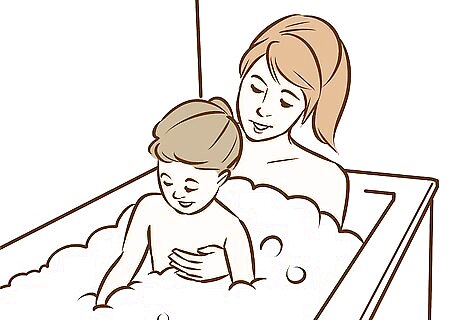
Clean around the nose during the bath. If your baby has congestion and mucus around or under their nose, clean this area during a bath. Rub a small amount of bath water or gently apply a wet washcloth around the nose area. This helps clear out the nose and remove any mucus under the nose.
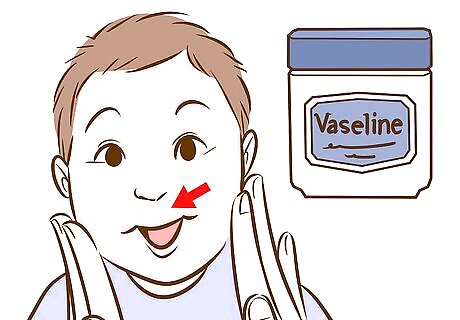
Spread protectant under the nose. If your baby’s nose is irritated around the nose, you can soothe that with some kind of skin protectant. Make sure you use a skin protectant that is made for babies. You can use petroleum jelly, lip balm, or a product designed to help a baby's chapped skin.
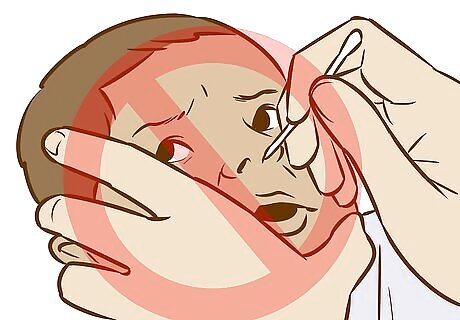
Avoid sticking anything in your baby’s nose. You should never stick anything in your child’s nose to clean it. Never stick cotton swabs, tissues, or cotton balls into your baby’s nose. This can damage your baby’s nose. When you use a syringe, you are not sticking the tip into your baby’s nostril. You are only resting it at the opening of the nostril.
Using a Bulb Syringe
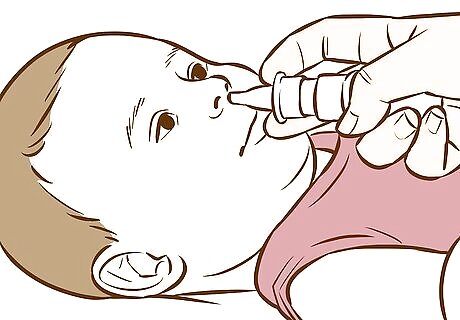
Squirt nasal saline into the nose. To help the break up the mucus, use nasal saline. Place your baby on their back and their chin tilted. Use a dropper to drop one to two drops into their nostrils. If the saline comes in a bottle with a pump, use the squirt pump to place one to two squirts into the nostrils. Try to let the saline solution stay in the baby’s nose for 10 seconds. You can buy unmedicated nasal saline at a pharmacy. You may also make your own saline solution. Dissolve ¼ teaspoon of salt into eight ounces of warm water. If you make your own, throw the solution out at the end of the day and make a new solution the next morning. Store it in a covered clean glass jar during the day. Don’t use saline drops on your baby for more than four days in a row. This can dry out their nasal passages.
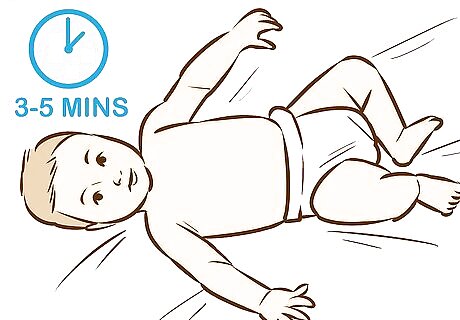
Wait a few minutes. After you put the saline solution into your baby’s nose, wait for around two to three minutes. Hold your baby with their head lower than their feet. This helps the solution get down into the nostrils. The baby’s congestion may break up and the nostrils may clear. However, if after a few minutes your baby’s nose is not any better, then you need to clean it out.
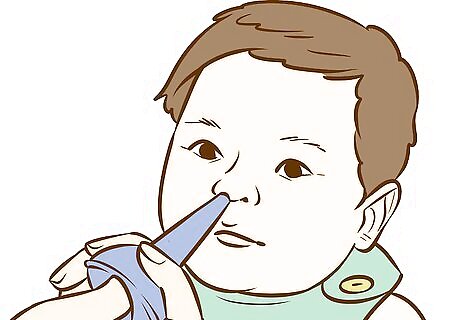
Place the end of the bulb against the baby’s nose. Take the rubber bulb syringe and squeeze the air out. This creates a vacuum to suck out the mucus. Carefully place the tip of the syringe against the nostril. It should fit snugly to create a seal. Gently let go of the bulb to pull the mucus into it. If your baby resists this process, stop and try again later. Make sure not to stick the tip too far into your baby’s nose. This can cause an injury.
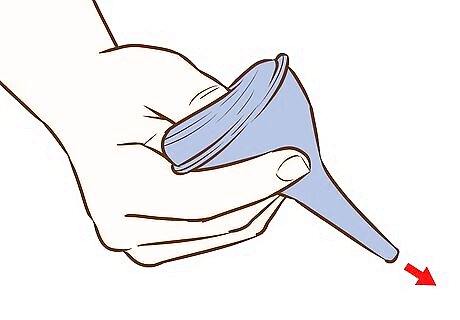
Clean out the bulb between each nostril. Before you do the same thing to the other nostril, you must remove the mucus from the bulb. Remove the syringe from the baby’s nose. Squeeze the syringe to clean the mucus out of the bulb. You may have to use some force when you squeeze to get it out. Then clean out the second nostril. Place a tissue around the tip to catch the mucus you expel from the tip.
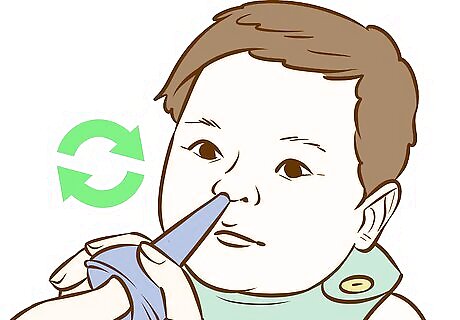
Repeat if there is still congestion after a few minutes. Your baby should be breathing better after cleaning the mucus out of their nose. However, if their nose is still stopped up after five to ten minutes, repeat the entire process again, including the saline solution. Make sure you only clean out your baby’s nose two to three times each day. More than that may irritate their nose. Your baby may get the most benefit before eating or going to sleep.
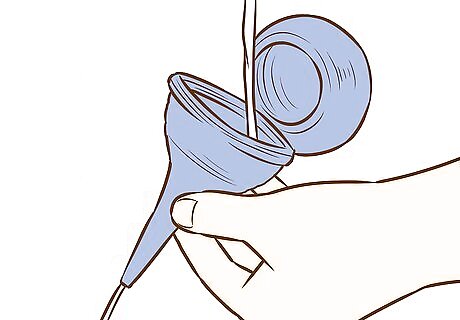
Wash the syringe. When you are finished, wash the syringe with soap and warm water. Place the tip of the syringe in the soapy water and squeeze the bulb to suck water into it. Shake the syringe to get soap all around the inside. Then squeeze it out. Rinse the syringe by squeezing warm clean water into the syringe multiple times. Continue to rinse until the water you squeeze out is clear. Even with regular cleaning, some bulb syringes can be prone to mold growth. Look for one that twists apart for easier cleaning and drying. Let the syringe dry by placing it with the tip down in a glass.
Using a Human Suction Nasal Aspirator
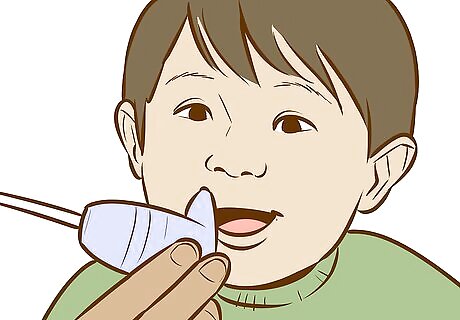
Position the tip in the child’s nose. Place the tapered end of the aspirator into your baby’s nose. The tapered end is connected to a long, cylindrical tube that will collect the mucus from your baby’s nose. Make sure not to stick the tube too far into your child's nose. Place it just inside the nostril.
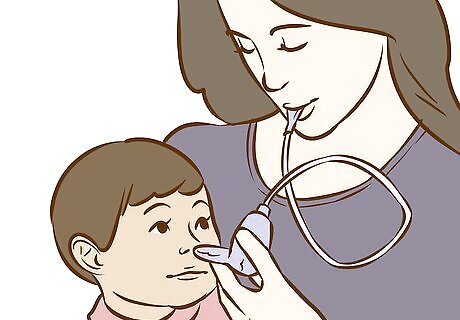
Suck on the mouthpiece to clear the mucus. At the other end of the tube is a mouthpiece that you place into your mouth. With the piece securely between your lips, suck on it to pull mucus from your baby’s nose. The intensity with which you suck will control how much suction is in your baby’s nose. The mucus will not be sucked into your mouth. The tube in your baby’s nose has a filter that will keep any mucus and germs from getting into your mouth.
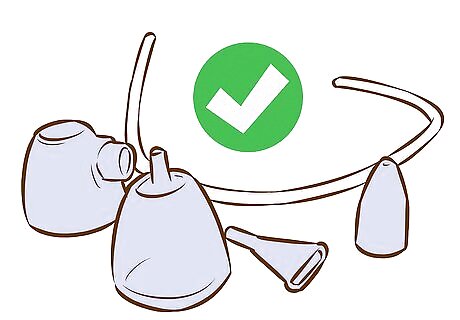
Wash the unit when finished. Once you are finished cleaning your baby’s nose, you need to clean it. Take it apart and wash the main tube, the nose tip, and the mouth piece. Use hot soapy water to wash the parts. Rinse well to make sure you’ve removed all of the soap. Don’t wash the long tube that connects the mouth piece with the main tube. If you need to wash it for some reason, or it get water in, make sure to let it dry completely.




















Comments
0 comment